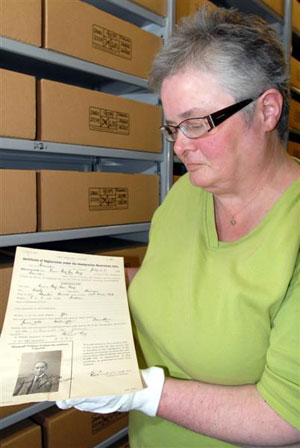Archivist
Tasks & duties

Archivists may do some or all of the following:
-
evaluate and select records to keep or destroy when they are no longer used by an organisation or business
-
liaise with local and central government departments, and to businesses on records that should be retained
-
arrange and describe records and other materials to enable public access
-
advise on suitable storage environments for archives
-
package and store archives for long-term preservation
-
organise exhibitions and displays
-
maintain and modify existing records management packages and systems
-
help people find information for their research
-
answer written and telephone enquiries
-
give talks on archives to community groups, and give guided tours on archival displays
Specialisations
Archivists may specialise in areas such as film, books, photographs or computer generated records.
Skills & knowledge

Archivists need to have:
-
knowledge of how to organise, store and find archival information
-
an understanding of the historical and potential research value of materials to be archived
-
sound analytical and research skills
-
the ability to use archival information management systems
-
good communication and people skills, as they work closely with owners of archival records and researchers
-
problem-solving skills
-
decision-making skills, as they have to choose which information to keep
-
organisational and time management skills
Archivists may also need to have knowledge of New Zealand history and government departments, and Maori language and culture.
Entry requirements
Archivists need to have an undergraduate or postgraduate degree that includes a research component. A postgraduate qualification with an archives, museum studies or library component is also advisable.
Secondary education
Useful school subjects include English, geography, history, economics and classics.
Tertiary education
Undergraduate or post graduate degrees that include a research component are needed to become an archivist. Useful subjects include:
-
history
-
art history
-
anthropology
-
archaeology
-
Latin
-
English literature
-
Maori studies
-
public administration
-
politics
-
law
-
geography
-
economics
-
information management
Training on the job
Archivists gain skills on the job. They may also attend seminars, conferences and workshops as part of their ongoing professional development as it is important to keep up to date with national and international best practice.
Useful experience
Useful experience for archivists includes:
-
historical, research, library or museum work
-
work as an archives assistant
-
experience in information management
-
work in a government department
-
work that involves dealing with people such as customer service or teaching
Related courses
Curatorial Studies
Librarianship and Information Management
For more information, please refer to Career Services.
Document Actions
